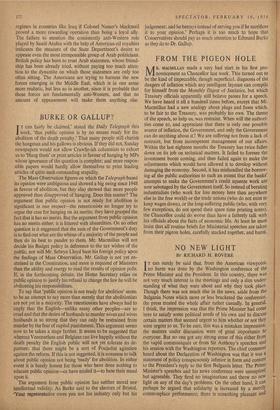BURKE OR GALLUP?
IT can fairly be claimed,' stated the Daily Telegraph this week, 'that public opinion is by no means ready for the abolition of the death penalty.' That many people still cherish the hangman and his gallows is obvious. If they did not, Sunday newspapers would not allow Crawfie-ish columnists to exhort us to 'Hang them' or print articles in favour of hanging by MPs whose ignorance of the question is complete; and more respon- sible papers would hardly allow themselves to print leading articles of quite such outstanding stupidity.
The Mass Observation figures on which the Telegraph based its opinion were ambiguous and showed a big swing since 1948 in favour of abolition, but they also showed that more people approved than disapproved of hanging. Does this matter? The argument that public opinion is not ready for abolition is significant in one respect—the retentionists no longer try to argue the case for hanging on its merits; they have grasped the fact that it has no merits. But the argument from public opinion has no merits either; it is littered with absurdities. On no other question is it suggested that the sum of the Government's duty is to find out what are the whims of a majority of the people and then do its best to pander to them. Mr. Macmillan will not decide his Budget policy in deference to the tax wishes of the public, nor will Mr. Selwyn Lloyd base his foreign policy upon the findings of Mass Observation. Mr. Gallup is not yet en- shrined in the Constitution, and more is required of Ministers than the ability and energy to read the results of opinion polls. If, in the forthcoming debate, the Home Secretary relies on public opinion to justify his refusal to change the law he will be abdicating his responsibilities.
To say that 'public opinion is not ready for abolition' seem: to be an attempt to say more than merely that the abolitionists are not yet in a majority. The retentionists have always had to imply that the English—unlike many other peoples—are so cruel and that the desire of husbands to murder wives and wives husbands is so strong that they can only be restrained from murder by the fear of capital punishment. This argument seems now to be taken a stage farther. It seems to be suggested that whereas Venezuelans and Belgians can live happily without the death penalty the English public will not yet tolerate its de- parture; that there might be a sort of Poujadist agitation against the reform. If this is not suggested, it is nonsense to talk about public opinion not being 'ready' for abolition. In either event it is barely honest for those who have done nothing to educate public opinion—or have misled it—to base their stand upon it.
The argument from public opinion has neither moral nor intellectual validity. As Burke said to the electors of Bristol, `Your representative owes you not his industry only but his judgement; and he betrays instead of serving you if he sacrifices it to your opinion.' Perhaps it is too much to hope that Conservatives should pay as much attention to Edmund Burke as they do to Dr. Gallup.


































 Previous page
Previous page